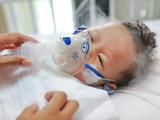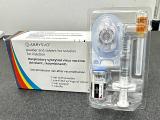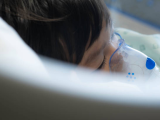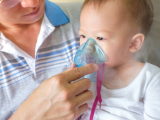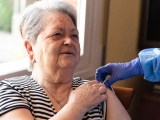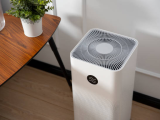Today, researchers from Moderna and around the globe report positive phase 2/3 results for its experimental respiratory syncytial virus (RSV) vaccine for people 60 years and older, with an efficacy of 83.7% and a good safety profile.
Published in the New England Journal of Medicine, the ongoing randomized, controlled trial involved 35,541 participants in 22 countries randomly assigned in a 1:1 ratio to receive one dose of the mRNA-1345 RSV vaccine or a saline placebo from November 2021 to October 2022. The median age was 68 years, 49.0% were women, 36.1% were non-White, 34.5% were Hispanic, and 29.1% were considered frail. The median follow-up was 112 days.
Moderna published the data in January before peer review.
This year, two RSV vaccines for older adults—made by GlaxoSmithKline and Pfizer, the latter of which is also approved for use in pregnant women to protect their infants—and a long-acting monoclonal antibody to protect babies up to 19 months old were approved by the US Food and Drug Administration.
The study authors noted that older adults are at higher risk for severe RSV and death because of age-related immune-system weakening and a higher prevalence of underlying medical conditions.
"Consequently, the societal burden and health care utilization that are associated with RSV infection in older adults are substantial," they wrote. "As the worldwide population ages, the burden of RSV infection is expected to increase—a situation that highlights the need for an RSV vaccine in this population."
Protection against acute RSV disease 68%
Sixty-four cases of RSV-linked lower respiratory tract disease with at least two signs or symptoms were confirmed (9 in the vaccine group and 55 in placebo recipients). Twenty cases of RSV-associated lower respiratory tract disease with at least three signs or symptoms occurred (3 in vaccine recipients and 17 in the placebo group). Twenty-six cases RSV-associated acute respiratory disease were reported in the vaccine group, and 82 were reported in placebo recipients.
The societal burden and health care utilization that are associated with RSV infection in older adults are substantial.
No cases of RSV-associated lower respiratory tract disease were observed in adults aged 80 years or older. Among participants with RSV-associated lower respiratory tract disease, lower rates of fever and of shortness of breath were reported among vaccine recipients than among the placebo group.
Vaccine efficacy (VE) was 83.7% (95.9% confidence interval [CI], 66.0% to 92.2%) against RSV-linked lower respiratory tract disease with at least two signs or symptoms and 82.4% (96.4% CI, 34.8% to 95.3%) against RSV with three or more signs or symptoms.
VE against RSV-associated acute respiratory disease was 68.4% (95% CI, 50.9% to 79.7%). VE against RSV-linked lower respiratory tract disease with at least two and at least three signs or symptoms was 91.7% and 90.0%, respectively, for RSV A and 68.5% and 71.5%, respectively, for RSV B. VE was 78.5% against RSV-associated acute respiratory disease caused by RSV A and 51.7% against disease caused by subtype B.
Relative to placebo recipients, vaccine recipients had a higher rate of solicited local adverse reactions (58.7% vs 16.2%) and systemic adverse reactions (47.7% vs 32.9%). Most reactions were mild or moderate and transient. Serious adverse events occurred in 2.8% of participants in each group.
"This phase 2–3 efficacy trial showed that a single 50-μg [microgram] dose of the mRNA-1345 vaccine in adults 60 years of age or older was efficacious against a spectrum of RSV-confirmed respiratory disease," the researchers wrote. "No safety concerns were evident."
Duration of immunity remains to be seen
In a related commentary, Amanda Cohn, MD, and Aron Hall, DVM, MSPH, of the Centers for Disease Control and Prevention, said that the population studied wasn't representative of the population of older adults who stand to benefit the most from the RSV vaccine, limiting generalizability and highlighting the ongoing need for more inclusion of those populations in clinical trials.
"For example, among persons hospitalized for RSV infection, a younger median age is observed among Black, Hispanic, and American Indian or Alaska Native persons than among White persons," they wrote. "Moreover, 75.9% of the trial participants had a score indicating 'fit' status on the frailty scale, and persons with immunocompromise were excluded from the trial."
Noting that the trial will continue to assess immune response to the vaccine for up to 24 months, Cohn and Hall wrote, "An important consideration will be how much protection an mRNA vaccine provides during subsequent RSV seasons and whether subsequent boosting will be appropriate. Such questions about duration of immunity, along with reactogenicity and cold-chain considerations, remain important areas for further evaluation in the implementation of mRNA vaccines."

